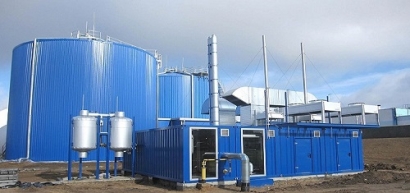
The EBRD provided a €2.9 million ($3.5 million) sovereign loan for the construction of the facility which will generate 4,380 MWh of electricity and 3,880 Gcal of heat per year from biogas extracted from wastewater sludge.
The Swedish International Development Cooperation Agency (Sida) invested additional funds for capital expenditure and project implementation consultancy work.
The biogas power plant is expected to achieve energy and cost savings, reduce greenhouse gas emissions and the volume of sludge, and improve the quality of services.
The opening ceremony was attended by First Deputy Prime Minister of Belarus, Anatoliy Kalinin, Minister of Housing and Communal Services of Belarus, Alexander Terekhov, Governor of the Brest Region, Anatoliy Lis, and Mayor of Baranovichi, Yuriy Gromakovskiy, On behalf of the international community, Sweden’s ambassador to Belarus, Christina Johannesson, attended the event, as did EBRD Senior Banker Renata Iksar.
Ambassador Johannesson, said, “The construction of the sludge digester in Baranovichi is a good example of international cooperation in Belarus. Following the successful completion of the first project in Baranovichi we are now looking forward to the finalization of our projects in Slonim, Vitebsk, Brest and Grodno.”
EBRD Head of Belarus, Alexander Pivovarsky, added: “The Baranovichi project has become a trailblazer in practical implementation of municipal investments, in compliance with our high environmental and social standards, and is paving the way for further municipal engagements in Belarus.”
To date, the EBRD has invested €1.96 billion ($2.33 billion) in 95 projects across Belarus. The promotion of renewables in Belarus is important for improving the country’s energy security.
The EBRD focuses on investments that bring environmental benefits and implement the Bank’s Green Economy Transition approach, which seeks to increase its overall volume of green financing to 40 percent of the EBRD’s annual business investment by 2020.

